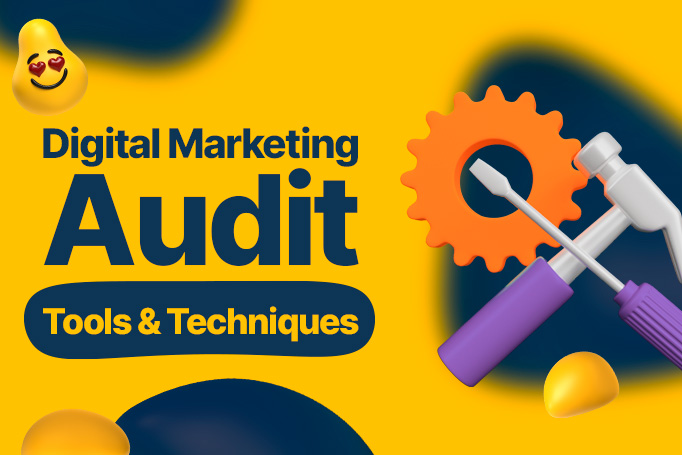Digital marketing is an ever-evolving world and, for businesses everywhere that depend on online marketing to boost sales and generate revenue, staying ahead of the curve is not just a nice goal to have, it's an absolute necessity to keep their business running.
To make sure that they have a strong and effective online presence, businesses often see the need for regular assessments of their digital marketing strategies, or digital marketing audits.
This is where you, as a creative and digital marketing expert, come into play!
If your client is coming to you because their digital marketing strategies leave everything to be desired, then it’s crucial that you be able to step in, conduct a digital marketing audit, and show them the light in the very best way you can!
How do you do that?
Allow us to assist! Today’s blog is going to be your comprehensive guide to the tools and techniques that you’ll need to conduct an effective, insightful, and helpful digital marketing audit.
Why are Digital Marketing Audits Important for Business Health?
We touched on just how important it is for businesses today to stay competitive and ahead of the curve.
A regular and well-executed digital marketing audit is an indispensable tool to help brands maintain that competitive edge.
The result of the audit lets their marketing team know what aspects of their strategy and campaigns to fine-tune to ensure that their brand is always evolving with the trends, adapting to changing customer needs, and optimizing their strategy for success instead of wasting time with low ROI strategies.
It’s not all about identifying weaknesses either. Audits can also identify a business's strengths so that they know what strategies are working and can enhance them or use them to a greater capacity.
Knowing their strengths also lets companies know where to allocate their resources and manpower, spend their time, and just, generally, use their budget more effectively.
All of this makes it that much easier for brands to make informed business decisions and set their long-term goals.
What to Look for in a Digital Marketing Audit

That’s a lot on the line, isn’t it?
Because of that, because brands are depending on your digital marketing audit services to deliver, it is imperative that you are equipped with the right tools and techniques to perform an audit that is both effective and accurate.
Here are the areas we recommend that you focus on.
Website Analysis
A thorough website analysis is a great place to start your audit.
This will involve the careful evaluation of every aspect of a brand’s website from its content to its UX/UI design.
Assess the following:
- Load times — When you navigate over to the website, are you tapping your fingers while it loads? A good website needs to load quickly, or it risks losing visitors.
- Navigation — Is the design of the website user-friendly and easy to navigate? Things like contact information and different sections of the website should be clearly marked and easy to find. If there are any navigational issues that might hinder the user experience, they need to be identified and addressed.
- Links — Any hyperlinks on the website should be checked to ensure that they are correct and functioning properly. Any broken links that lead to dead ends can frustrate a user and cost a company in their SEO rankings so it’s important they are updated or removed.
- Backlinks — Backlinks should come from authoritative and relevant sources. If there are any toxic, low-quality backlinks, they should be removed immediately.
- Mobile-friendliness — Odds are a significant portion of a website’s visitors are doing so from their smartphone or tablet. It’s crucial to make sure that visuals, text, and load times are optimized for mobile friendliness.
- Content — It’s vital to review the quality and relevance of the content that is present on your client’s websites. This includes any written content like articles, blog posts, product descriptions, FAQs, and testimonials as well as multimedia content like videos, images, embedded social media posts, and contact forms. Check that there is no outdated or duplicate content and that all content aligns with the brand’s messaging and identity.
SEO Audit
Ranking high in search engines is extremely beneficial to any brand, since it makes their content and website more visible, which increases both the number of visitors and conversion rates and improves brand recognition.
To perform an SEO audit, you’ll want to do the following:
- Examine Keywords — Check the keywords your client is using to determine if they are the most effective and relevant keywords to rank for.
- Complete a technical SEO audit — A website audit not only fixes user experience problems but also cleans things up for technical SEO purposes as well. To improve technical SEO, analyze the website’s structure, site speeds, content, alt tags, mobile friendliness, and backlinks since an effective, valuable, and user-friendly website positively impacts SEO scores.
- Optimize Social Media Platforms — SEO isn’t limited to just websites. Optimize other aspects of the brand, such as social media, and be sure your client’s socials and the content they contain are optimized for SEO.
Content Audit
It’s very important to check the written, visual, and multimedia content that your client’s brand is putting out, both on their website and across any content marketing channels.
Poor content leads to higher bounce rates and less customer satisfaction, which reflects poorly on SEO as well as customer engagement. Not something you want.
Examine all content for the following:
- Keywords — Your SEO audit should help here. Be sure all written content and the alt tags, product descriptions, headers, etc. on your client’s websites are targeting the most effective keywords.
- Quality — All content should be of the highest quality in order to perform at its optimum potential. This means well-written content, free of errors, and high-quality visuals and videos. Interactive content and downloadables should function as needed and be visually appealing and valuable.
- Relevance — Review your client’s customer personas and check content to make sure that it aligns with the needs of your client’s target audience. Content can be well-written and visually appealing, but if it isn’t connecting with who it needs to connect with, then it isn’t doing its job.
- Content Strategy — All content should align with your client’s goals and be consistent in distribution, distribution channels, and overall messaging. Content to check here includes blog posts, articles, videos, infographics, social media content, and more.
Social Media Audit

Carefully examine your client’s social media performance and their level of activity.
What social media marketing strategies or content are they using that is getting them engagement? Alternatively, what are they doing (or not doing) that could potentially be costing them engagement?
Evaluate the following during your social media marketing audit:
- Follower Growth — Is your client steadily gaining new followers? If their follower growth is stalled or in decline, it probably indicates a need for improved content or better audience targeting.
- Posting Frequency — How often does your client release social media content? Infrequent posting leads to reduced visibility, but excessive posting overloads your audience and drives them away. Finding the right balance between an active social media presence and being a pest is key!
- Content Quality and Relevance — Your client’s content should be high-quality and relevant to the target audience and the social channel they’re on, including Facebook, Twitter, LinkedIn, Instagram, TikTok, and others. Outdated content or content that doesn’t match the interests of your audience can lead to reduced engagement and a disconnect.
Email Marketing Audit
Email marketing can be a great way to generate leads and get your client’s content in front of the right eyes. But only if it’s effective!
Analyze their email campaigns and metrics, including open rates, click-through rates, and subscriber lists.
Also, examine the following:
- Email Lists — Check the segmentation of your client’s email lists. Are they segmented in the most effective way? Are there some users on their lists that are inactive or irrelevant? Clean up the client’s list if necessary.
- Subject Lines — Bad or poorly-written subject lines can cost your client clicks. Check the subject lines they are using and replace any ineffective ones with options that could lead to higher open and click rates.
- Content — Assess the effectiveness of email content. Are users responding to the content marketing strategies your client is using? Is some content doing better than others? Is other content missing its mark and looking to be a waste of time and effort? Reexamine their audience’s user personas and adjust as necessary.
Paid Advertising Audit
Evaluate any paid advertising campaigns, like Google Ads, YouTube ads, and social media ads. How are they performing? Are the ads relevant? Targeted at the right audience?
It’s possible you’ll have to help your client adjust targeting, budgets, and ad creative if needed to make any PPC campaigns more effective.
Examine the following:
- Landing Pages — Are the landing pages visually pleasing and easy to navigate? If a customer lands on it via a digital ad or social media ad, will they be compelled to stay? If the landing page is intended for lead generation, is it optimized to do so? Are lead forms easy to complete? A lead form that’s too overwhelming or asks too much information can drive potential customers away.
- Digital Ads — Your copy and design of your client’s digital ads should be engaging and persuasive. They should be placed in a way that is ideal for the target audience and scheduled to times they’ll have the most impact. Ad extensions should be used to enhance visibility and their PPC budget allocated effectively.
- CTA buttons — Are CTA buttons on ads and landing pages easy to see? Are they easy to navigate and persuasive enough to get clicks?
- Keywords — Review the effectiveness of keywords in both digital ads and on landing pages. Ensure that the selected keywords are highly relevant to the client's business and are optimized to improve search engine rankings. Analyze the performance of keywords in terms of click-through rates and conversions. Is any fine tuning needed? That's fine! Just adjust their keyword strategies to maximize results.
Tools and Strategy
It’s also important to examine the tools your client is using as well as their overall digital marketing efforts.
Here is what you’re looking for:
- Tools or software — What tools is your client using to choose keywords or measure their metrics? Are their tools effective? Up to date? Evaluate the complete toolbox your client relies on to help them make informed decisions with their digital marketing.
- Marketing Strategy — Is their overall strategy working for them? Is there a point in the customer journey where it appears that potential customers are dropping off? Examine the disconnect because it could be an area for improvement.
- Customer Feedback — Sometimes customers will make your job easy by leaving feedback. Collect this feedback from customers to gain insight and find areas where your client could improve.
Competitive Analysis
It’s a good idea to do a competitive analysis as well.
To do this, study your client’s competitors' digital marketing strategies, looking for their strengths and weaknesses. Examine them carefully to see what is working for competitors that could also be working for your client as well.
Look for any opportunities or strategies that your client could do better to give them a competitive advantage!
Essential Tools for a Digital Marketing Audit

What tools will you need to perform a digital marketing audit and best evaluate your client’s strategy?
If you’re looking for some suggestions, we’re happy to share our favorites below.
Website Analysis Tools
- Google PageSpeed Insights — A useful Google tool for assessing a website’s loading speed and offering optimization suggestions to improve it.
- Google Search Console — Another Google tool that helps monitor site presence in Google search results, providing data on issues like broken links.
- Ahrefs or SEMrush — SEO and backlink analysis tools that allow you to track your site’s backlinks, and keywords, as well as monitor your competitors.
- Google Analytics — Web analytics tool that provides detailed stats and analytics for websites to offer insight into user behavior and interaction.
SEO Audit Tools
- SEMrush or Ahrefs — These two tools pop up again in our list. This time for keyword research.
- Screaming Frog SEO Spider — A web crawler that helps identify on-page SEO issues and website structure issues.
- Yoast SEO — A popular WordPress plugin that assists in on-page SEO optimization.
- Google Search Console — Useful for monitoring website health and identifying potential issues that could have a negative impact on SEO rankings.
Content Audit Tools
- Surfer SEO and Clearscope — Tools for content optimization that provide insight on keyword usage, content relevance, and SEO improvements.
- Google Analytics — Offers data for content engagement insights, like page views, and user interaction.
- HubSpot Content Strategy Tool — Assists in creating and aligning content strategies.
Social Media Audit Tools
- Hootsuite or Buffer — Social media management platforms that help schedule and monitor posts on various social networks.
- Sprout Social — A tool for social media analytics, like performance and engagement of social media campaigns.
- SocialBee — A platform for managing social media posting and engagement.
Email Marketing Audit
- MailChimp or Constant Contact — Popular email marketing platforms for creating and sending email campaigns.
- Brevo — Formally Sendinblue. A tool for email automation and running email marketing campaigns.
- HubSpot Email Marketing — A part of the HubSpot suite, offering insights and analytics for email marketing efforts.
Paid Advertising Audit
- Google Ads — A platform for creating and managing PPC advertising campaigns on Google search and display networks.
- Facebook Ads Manager — A Meta tool for creating and managing social media marketing and advertising campaigns on Facebook and Instagram.
- Unbounce — A platform for creating and optimizing landing pages for PPC campaigns.
Competitive Analysis
- SimilarWeb — A useful tool for competitive analysis, offering insights into website traffic, audience demographics, and more.
- SEMrush — In addition to providing info for keyword research and website audits, SEMrush provides comprehensive competitor research and analysis.
Tools and Strategy
- Marketing Automation Tools — Software platforms like HubSpot, Adobe Marketo, Salesforce’s Pardot, ActiveCampaign, and Mailchimp help you automate marketing processes, email campaigns, lead nurturing, and more.
- Customer Feedback Tools — Gather feedback about your customers’ experience with tools like SurveyMonkey and Typeform to collect data from your target audience and website visitors.
<div class="c-blog_comp-cta cc-component-2"><div class="c-blog_comp-cta-left"><div class="c-blog_comp-cta-left-wrap"><img src="https://global-uploads.webflow.com/61cdf3c5e0b8155f19e0105b/63695243d096983691046ac3_Potential-Creative.png" loading="lazy" alt="" class="c-blog_comp-cta-left-img"></div></div><div class="c-blog_comp-cta-right cc-dark"><div class="c-blog_comp-content"><div class="c-text-wrapper cc-mb-32"><div class="c-title-4 cc-bold"><strong>Like to work as a freelancer with consistent income?</strong></div></div><div class="c-text-wrapper"><div class="c-text-2">Designity's collaborative model is designed to give you all of the perks of being a freelancer without the income instability.<br></div></div></div><div class="c-blog_comp-wrapper"><a href="http://designity.com/creatives" target="_blank" class="c-button w-button"><strong>Join Our Creative Community</strong></a></div></div></div>
Join the Best Digital Marketing Audit Team Around
If this list doesn’t have much new information for you because you’re already an experienced digital market auditor who is a master of the tools of the trade, then we’d like to ask you one question.
Why not join the Designity community?
Working at Designity puts you on the same team as the top 3% of US-based creative talent, including designers, marketers, branding experts, Creative Directors, and more, whose sole mission is to give brands the eye-catching collateral and winning strategies they need to see success and business growth.
Enjoy working with a variety of brands in just as many different industries and enjoy doing so on your own time and from the comfort of your own home because Designity is 100% remote!
If you think your digital marketing has what it takes, then why not put your skills and knowledge to the test by applying today?
You never know what brand needs your expertise next!

























